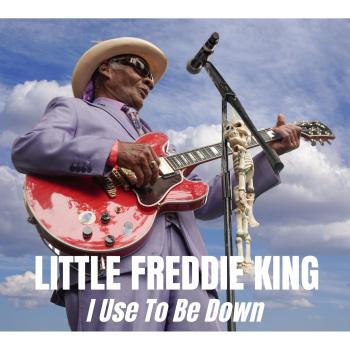
I Use To Be Down Little Freddie King
Album info
Album-Release:
2025
HRA-Release:
21.02.2025
Album including Album cover
- 1 Bywater Crawl 03:05
- 2 Pocket Full of Money 03:03
- 3 Going Up The Mountain 04:10
- 4 Bad News 03:58
- 5 I Used To Be Down 02:20
- 6 Coming Home to Jesus 02:48
- 7 Bus Station Blues 03:43
- 8 Standing At Your Door 03:22
- 9 Can't Do Nothing Baby 04:36
- 10 Mean Little Woman 02:10
- 11 Going Upstairs (Live) 04:49
Info for I Use To Be Down
GUT-BUCKET BLUES MASTER Little Freddie King, he used to be down but his fans have raised him up. He moved out of his run-down apartment in a deteriorating neighborhood and moved to Musician Village, located in New Orleans upper 9th Ward. His domineering wife who shot him once has long since gone to her eternal rest. He got rid of his rickety bicycle and bought a new two wheel Cadillac, an electric bike (EV). It is easier on his 84 year old legs he says. His tormented ulcers have healed and no more headaches, only an occasional visit from “Arthur”… arthritis that is. Keeping busy playing his guitar and a few gigs is his dose of blues medicine that keeps him moving forward. Like a fine wine, this collection of songs is the best yet because they have aged. (“Wacko” Wade, MadeWright Records)
We first cottoned onto Fread Martin, a.k.a. Little Freddie King, a few years back when he released his GREAT "You Don't Know What I Know" disc for Fat Possum, the great Mississippi label dedicated to overlooked older bluesmen who play gutsy, lo-fi blues. A hard-living character who has been playing the rural electric blues of his native Mississippi in the lowest bowels of NEW ORLEANS' now-devastated Ninth Ward for years, King and his band have a penchant for hard-hitting, minimalist chords and lyrics, delivered by a cracked, heavily lived-in voice. Much of King's material has an old-style blues feel, but he is at his most charming when he strips it down to just guitar and howling vocals as depicted on his 2008 "Messin' Around tha House" and excellent live performance on his 2010 "Gotta to Walk with da King".
Little Freddie King, vocals, electric & acoustic guitars
“Wacko” Wade Wright, drums, tambourine
Stephen Daly, 2nd guitar & slide
Paul Defiglia, electric bass
Robert Louis DiTullio Jr., harmonica
Elan Mehier, piano
Robert Snow, bass on ‘Goin’ Upstairs’
Little Freddie King (aka Dr. Bones)
has certainly paid his dues. The past 82 years he has survived three shootings, stabbings, a near fatal bike accident that pressed his spine, a stomach ulcer doctors believed would kill him, an accidental electrocution, the hurricane that ripped New Orleans apart in 2005, and now a pandemic. On his voice you can feel the trials of life. The music inside is the dose of BLUES MEDICINE that kept him going. King is a country-style blues musician, links to an era when live music poured from the back-of-town nightclubs that were ubiquitous throughout New Orleans’ African American neighborhoods, fostering a musical subculture of downhome Mississippi blues that developed from the ground up in New Orleans. Artist who is among the last of his kind.
Freddie Martin, better known as blues guitarist Little Freddie King, is an under recognized giant of country-style blues. In a town filled with funk, R&B and jazz, Little Freddie King is a living link to the rough Delta style that is rare in the Crescent City. The 82-year-old King moved to New Orleans from McComb, Miss. to live with his sister. He hoboed a freight train at fourteen and headed for New Orleans looking for work and seeking his musical interest. Little Freddie found his way upriver to a little community known as Shrewsbury – a black area of town with juke joints lining both sides the street. There he met and performed with legendary musicians like Polka Dot Slim, Boogie Bill Webb, Jimmy Reed, Slim Harpo and Harmonica Williams. Freddie took a job as a longshoreman working alongside his buddy – Slim Harpo. He found steady music gigs in a variety of different taverns, such as the Horseshoe Lounge, The Stereo Lounge and Crockett’s Bar, and the Dew-Drop Inn.
This album contains no booklet.








